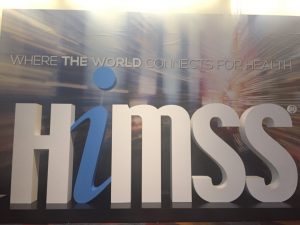At this point, it’s safe to say we think you should attend HIMSS19 in Orlando. From networking opportunities to technology demos and keynote speakers, the conference offers myriad opportunities for healthcare professionals to collaborate and learn new things. Among them, education sessions that can count toward continuing education credits for healthcare professionals.
There is something for everyone when it comes to education sessions at the conference and 2019 is yet another chance to further the conversation around healthcare’s relationship with any number of things, from AI and machine learning to innovative data analytics solutions for payers and providers alike.
Sessions are broken down into categories, with each category being given an allotment of education sessions based on the popularity of topic, availability of speakers and the approval of proposed topics.
Here are 7 education sessions we’re excited for. We’ve outlined them by category, specialty and what they cover. Times and room numbers at the Orange County Convention Center are also included.
Category: Clinical Informatics and Clinician Engagement
Session: Integration of Registry Data into Clinical Care Process
When and Where: Wednesday February 13 10 a.m. – 11 a.m. W315B
More than 30,000 people in the U.S. are living with cystic fibrosis according to the Cystic Fibrosis Foundation Patient Registry (CFFPR). This session will show how CFFPR data, collected since 1966, has been used to shape care guidelines for cystic fibrosis patients and to study treatments and design clinical trials.
The data has been used in a number of quality improvement projects and will be the subject of a discussion centered on how registry data should be positioned for health IT use. The goal of the session is to provide clear value to clinicians, demonstrate practical use of the data and to show the difference between EMR and registry data.
Category: Data Analytics/Clinical & Business Intelligence
Session: Changing the Culture of Data to Support Value-Based Models
When and Where: Tuesday February 12 1:30 p.m. – 2:30 p.m. W308A
Focused on how the right data strategy can bend the cost curve for providers, this session will aim to provide accountable care organizations with the ability to accrue, manage and share data and the insights they get from it. Learning objectives for attendees include knowing how to create a data syndication plan and apply data validation methodologies.
This session will be led by David Coe, Vice President of Data Management, Analytics and Population Health Technology for Banner Health Network.
Category: Health Informatics Education, Career Development & Diversity
Session: EU/US Collaborations to Ensure a Capable eHealth Workforce
When and Where: Thursday February 14, 4 p.m. – 5 p.m. W303A
As Kerry Amato, Director of Professional Development for HIMSS, noted in our most recent episode of The Health IT Beat, workforce is a major issue in healthcare right now. Among the many issues regarding healthcare professionals is the capabilities of the healthcare workforce, and in particular, its ability to harness the power of information technology.
Evidence suggests that the current healthcare workforce doesn’t have the skills necessary for maximizing health IT’s potential. This session, presented by the Technology Informatics Guiding Education Reform (T.I.G.E.R.) initiative, will address options for international and interprofessional efforts to bridge the skills gap for healthcare workers.
Category: Health Information Exchange, Interoperability & Data Integration
Session: Analyze the Remaining Gaps as Data Exchange is Expanded to Broader Stakeholder Groups in Support of Innovation
When and Where: Monday February 11, 11:15 a.m. – 12:15 p.m. W230A
As interoperability inches closer to a reality, the number of stakeholders in health information exchange has increased. As a result, a number of gaps in data exchange have surfaced.
This session looks at the barriers to data reciprocity and the impact that data exchange gaps have on patient care. Steven Lane, Clinical Informatics Physician Director for Sutter Health, will lead the discussion and describe new ways in which some stakeholders are aiming to address these gaps.
Category: Improving Quality Outcomes Through Health IT
Session: Using Real Time Analytics to Improve Patient Clinical Outcomes
When and Where: Wednesday February 13, 4 p.m. – 5 p.m.
We often hear that the end goal of improving care outcomes is being proactive rather than reactive. Analytics has a major role to play in these efforts and the move from retro to real-time data analytics will play a major role in their success.
This session will be led by leaders from Adventist Health System and will focus on successful deployment and integration of real-time analytics and the lessons learned from deployment of data visualization tools in this scenario. Adventist now has the power to combine analytics and technology to help clinicians, including real-time reporting and dashboards for nurses.
Category: Cybersecurity, Privacy & Security
Session: Artificial Intelligence Helps Put Privacy on Autopilot
When and Where: Thursday February 14, 11:30 a.m. – 12:30 p.m. W230A
Privacy leaders from Johns Hopkins Health System will lead the session, outlining their methods for using automation to enable full visibility into the privacy threats it faces and target the most serious threats.
The speakers will focus on two methods they use currently: AI powered privacy monitoring and education for employees who violate privacy policies. Their objective will be to demonstrate measurable impacts that an automated approach can have on resolving cases and reducing future privacy violations. They will describe some of the challenges they faced in automating policy oversight and educating workers at scale.
Category: Process Improvement, Workflow, Change Management
Session: Leveraging EHR Data to Improve OR Operations – A University Hospital Case Study
When and Where: Tuesday February 12 10:30 a.m. – 11:30 a.m. W208C
An examination of metrics used to optimize OR performance and efficiency, this session will look at how Saint Peter’s Healthcare uses EHR data to improve operating room access for surgeons with mobile and web tools. It will also look at traditional metrics used to measure efficiency and place increased accountability on surgeon-centric metrics and reporting.
The objective of the session is to help improve capacity management during standard business hours and to increase accountability with the right metrics that help surgeons better understand the reasoning behind OR performance metrics.



